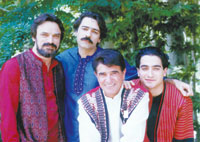Iran, once ancient Persia, is home to one of the world’s oldest civilizations with a unique culture and tradition. While it is a land that has been the seat of emperors and subject to many invaders, it has maintained its distinct cultural identity for millennia.
The arts have always been an important part of Iranian culture. In many ways, Persian artwork emphasizes the reunification of man with God. It is believed that the sound of the heavenly orbs and creation resonates through living beings. The Persian belief in the ability of the arts, and music in particular, to affect the soul is still present in classical Persian music today.
Persian music is monophonic. It consists of melodic soloists, or sometimes duets, and percussion accompanists. It is based on the idea of a suite in solo mode where the musician chooses ornamentations to finish the piece. Performances include improvisations that move around the chosen melodic pattern. An important and difficult task is making smooth transitions from each suite to the next.
Persian classical poetry, some of the world’s greatest literature, is what vocalists have used throughout the history. Singers bring classical Persian poetry to life with a free rhythm, sung without musical time signature but with the internal rhythm of phrasing.
On March 12, Masters of Persian Music will perform at the Berklee Performance Center. Featuring three of the most important figures in classical Persian music, Masters of Persian Music will explore the rich heritage of ancient Sufi and contemporary poetry, and Persian music. Iran’s greatest vocalist Mohammad Reza Shajarian, along with Hossein Alizadeh on taar (long-necked plucked lute) and Kayhan Kalhor on kamancheh (spiked fiddle), will be accompanied by Shajarian’s son Homayoun Shajarian on tombak (goblet drum) and vocals.
Their music is mostly improvised and is based on a series of modal scales and tunes which must be memorized. The maestro (ostad) memorizes the entire repertoire of more than two-hundred series (radif). Each is divided into short melodies called gusheh, which are then divided into twelve dastgah. Shajarian, Alizadeh and Kalhor are all great masters of this, knowing the repertoire inside and out.As the Persian saying goes: “Hearing about it would never be the same as seeing it!”
Masters of Persian Music will perform at the Berklee Performance Center 8 p.m. Saturday, March 12. Tickets go for $28-50 and are on sale now (includes Berklee $0.50 restoration fee). For more information or to purchase tickets online visit www.worldmusic.org.

